 By Jim Pumarlo
By Jim Pumarlo
McCargo continues career in journalism as instructor, ASPA Director
Based on a diverse career in print and broadcast media, as well as her current position in the academic world and as director of the Arkansas Scholastic Press Association, Renette Smith McCargo has a clear perspective of journalism today and its impact on contemporary students.
McCargo has extensive experience working in newspapers, radio stations and television outlets in Arkansas and Tennessee. At a key point in her career, she made the decision to return to college to obtain an advanced degree and currently is an instructor at the University of Arkansas School of Journalism and Strategic Media in Fayetteville.
“My concern about journalism today is the audience, spreading misinformation, disinformation, and deep fakes without attempting to fact-check details in the story,” McCargo said. “As a journalism instructor, I believe I have to teach students to analyze what they view and read. Additionally, I want to teach students to look for more than one source on the topic. Student journalists must learn to ask more questions, listen to the responses, and trust their instincts.
“Since the one-to-many storytelling model shifted to the many-to-many model, more people are acting as journalists but failing to engage in ethical journalistic practices. Many consumers interact with multiple news sources daily. Some audiences spend too much energy sharing questionable details rather than questioning the inaccuracies or credibility issues.
“Eventually, the new reporters become older reporters, and they will have similar concerns about the shift in journalistic practices.” McCargo observes that students still love to write and appreciate the freedom of expression crucial to the field of journalism. However, as newspaper career opportunities decline, students are gravitating to broadcast, advertising and public relations. “We have to adjust to what our communities want and how they receive information,” she said.
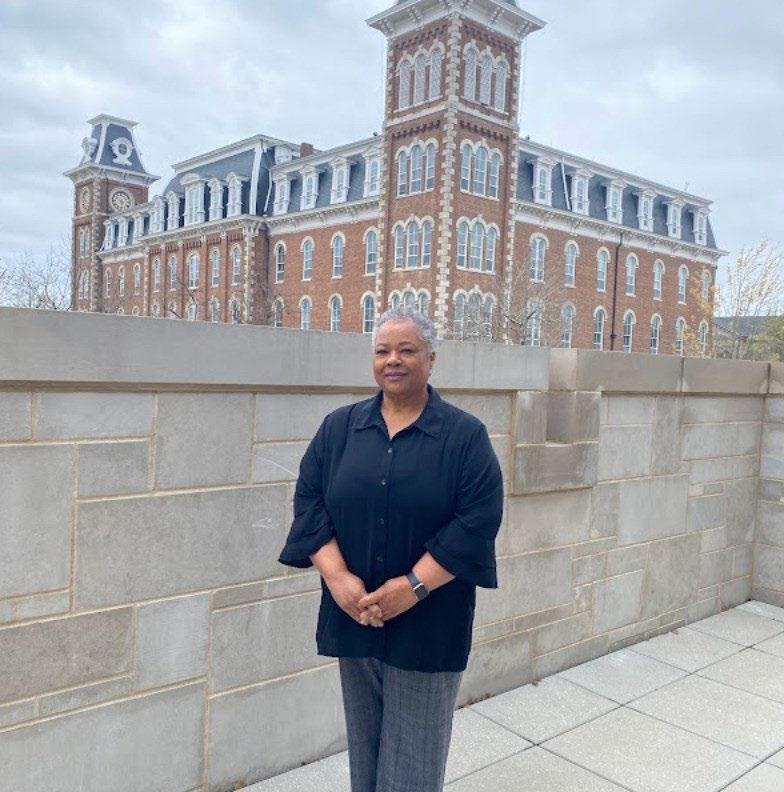
McCargo stresses to students the need to adapt and adjust to changing forms of expression and audience participation. “But it’s still journalism,” she said. “It’s communicating information to people to help them make informed decisions about their lives.”
Despite the challenges to the traditional journalism format, McCargo receives newspapers from all over the state of Arkansas and uses them in her classroom settings. “There is a lot of good work still being accomplished in Arkansas newspapers,” she said.
McCargo maintains it is important to continue to use the word “journalism” in colleges and universities, even in a changing educational environment. She said students still are searching for and appreciate the ideals contained in the word and the discipline.
In her view, the perspective and skills gained in obtaining a journalism degree often can reach beyond such standard career choices as newspapers, magazines, radio or television.
“As journalism educators, I think we must emphasize some ‘old school’ practices such as understanding newsworthiness, writing attention-grabbing lead sentences, and seeking multiple sources for every story.
“You learn to read and to write and to share information with others clearly and in an understandable way. And that can be very helpful in many career choices. Journalists also are good at
Vol.19 | No. 13 | Thursday, March 28, 2024 | Serving Press
Guest
Arkansas Press Association Publisher Weekly
and State Since 1873
Column:
Arkansas Publisher Weekly 1 March 28, 2024 Omissions as damaging as glaring errors to credibility 9 5 See McCARGO page 2 APA Advertising conference returns to scenic Petit Jean Mountain
Renette Smith McCargo
McCargo
Continued from page 1
research and documentation.
“The study of ethics also sets journalists apart, and that can be critical in many fields. You learn not to make mistakes that would hurt your company or your organization. With that in mind, I encourage students in other fields of study to consider minoring in journalism to learn how to work within a code of ethics.
While some traditional positions have declined, McCargo sees new opportunities for journalism majors, such as becoming entrepreneurs, freelance writers or perhaps working with non-profit organizations. “If you don’t initially find what you need, then you should create it yourself,” she said. She believes journalism is excellent preparation for law school, since many of the required skills are similar. One of her friends, who will be a guest speaker at the upcoming Arkansas Scholastic Press Association convention, obtained a journalism degree from Arkansas State University and now is an attorney in Little Rock.
The annual event will be held April 25-26 at the Statehouse Convention Center in Little Rock. McCargo, who has served as executive director of the ASPA since October 2020, is excited that some 800 participants from all over the state will gather to delve into the latest trends, techniques and tools in journalism.
to upholding the highest journalistic standards.
McCargo finds the ASPA position fits perfectly with her love of quality journalism and a commitment to assisting young people in achieving their goals and dreams.
The annual convention covers a broad range of disciplines, including music, layout, design, photography, writing and editing, videography, podcasting and art. Workshops and guest speakers are designed to assist young journalists in learning new techniques and improving their skills.


The students will attend expert-led workshops and connect with other students, educators, alumni and industry professionals. The awards ceremony recognizes outstanding work by middle school and high school students from across the state. “The anticipation is always sky-high as the winners are announced,” she said. “I can’t express to you how great and how exciting it is. There are lots of cheers and chants.” More information about the convention can be found at www.arkansasscholasticpressassociation.org.
Founded in 1929 by Walter Lemke, the ASPA supports, promotes and recognizes excellence in scholastic journalism in Arkansas. The organization empowers the next generation of journalists and storytellers through workshops, conventions and a commitment
Judges provide feedback to both individual journalists, as well as collective efforts such as both print and digital newspapers, literary magazines, yearbooks, broadcasts, screenplays and film.
“We have hundreds of students at the convention who are so excited and proud of the work they do, and they are very good at it,” McCargo said.
“High school and college students who participate in student-run journalism use some traditional reporting methods,” she said. “However, the students report on what is relevant to them. Student journalists engage in topics and issues that directly affect their generation, such as social media, environmental activism, and technology trends.
“A few high school students met with me after a national journalism event. They listed various reasons for their interest in journalism. Finally, one said, ‘We just want to be heard’.”
“So, journalism for some students is about expressing themselves and communicating their feelings. For other students, journalism is about telling other people’s stories and sharing helpful information.”
McCargo was born in Pine Bluff, the youngest of 14 children, and graduated from Dollarway High School. She went on to Arkansas State University in Jonesboro, earning a bachelor’s degree in
Arkansas Publisher Weekly 2 March 28, 2024 See McCARGO Page 3
McCargo started her journalism career in radio.
McCargo with attendees of the 2022 ASPA Convention.
McCargo
Continued from page 2
radio/television, the first in her family to obtain a college diploma. Her first job after college was as a reporter for the Silver Star News, an African American newspaper in Memphis. She then moved to Jackson, Tenn., where she worked in a variety of positions at a newspaper, radio stations and a television station. One of the breaks in her career came when she called a radio station in Jackson at 4 a.m. to make a song request (Peabo Bryson). The DJ said he really liked the sound of her voice and asked if she might be interested in a job at the station. He invited her to meet with the owner, James Wolfe, and he hired her on the spot. They remained good friends over the years until his recent death. Her initial work at the station was DJing a “love song” format late at night.
Her radio work covered all facets, including copywriting, advertising, promotions and on-air time slots. Her experience ranged from country to hip-hop to southern gospel, with a bit of big band music thrown in.
She later accepted a position at WBBJ-TV in Jackson, specializing in the production side. “I always liked the behind-the-scenes work and I was good at it,” she said. “I was offered a news anchor position but declined it.”
McCargo then moved to WHBQ-TV in Memphis for a couple of years, commuting from her home in Jackson.
At that point a dramatic change in her life occurred – her sister was suffering from a serious illness and McCargo and her husband made the decision to raise her sister’s five children. Because of that responsibility, they decided a move back to Arkansas was in order and she became a reporter at the Evening Times in West Memphis. She worked there for seven years, as the flexibility of being a
reporter allowed her to devote the proper time to raising the children and attending their events in school. “Being a reporter at the Evening Times was definitely my favorite position other than the work I have done in higher education,” she said.
After a stint as a marketing manager for Southland Racing Corp. in West Memphis and then the Langston Companies in Memphis, she made the life-changing decision to return to Arkansas State University for graduate studies. After two years of study, she earned a master’s degree in mass communications. While earning her degree, she also worked part-time at both KASU radio and KAIT-TV in Jonesboro.
Two days before graduating, she began teaching a promotional writing class at ASU. Shortly thereafter, she was offered a full-time position which changed both her career and her life. Dr. Brad Rawlins hired her as an academic adviser, while retaining her teaching position.
“I just loved working with the students, helping them get on track to graduate and then find good positions to start their careers,” she said. “I put my whole heart into that job. I wanted to give students a sense of accomplishment that no one could take away from them. It was so great to see them achieve their dreams. There were great rewards for them and for me.”
Many of her students also were first generation college graduates, providing the basis for a strong bond. She remembers one graduation celebration with students and their families in which a graduate’s proud father joked that “there is the woman who got that boy out of my pocket.”
McCargo greatly appreciates Dr. Rawlins for making her academic adviser position a reality. “He trusted me to make decisions that would help students graduate from the university and then help

Arkansas Publisher Weekly 3 March 28, 2024 See McCARGO Page 4
Staff at the The Evening Times enjoy Halloween in early 2000s.
McCargo
Continued from page 3
them as they looked forward to their careers,” she said. “It changed my outlook on what I could do to help people. I’ve always wanted people to win and get ahead.”
McCargo is profoundly thankful for her time in the journalism department at ASU. “I believe they prepared me well for every position I have ever held. They taught us how to communicate effectively, how to write for print, broadcast, advertising and public relations and also how to be involved in management.
“The instructors were very encouraging,” she said, “and talked to me as though I had the brightest future – that I could do anything. In any job interview I’ve ever done, I felt confident in what I said and what I did.”
Clearly, McCargo has been able to navigate a rewarding career path while providing opportunities for her family. “My five older children are doing well and have great families of their own,” she said. She has 13 grandchildren. McCargo also has two birth children, both students at the University of Arkansas in Fayetteville.
to make presentations on “Ethical Practices of Journalism” and “Prose, Poems and Drama!”
She really enjoys train travel and recently made a trip from Walnut Ridge to Sacramento, Calif., with the highlight being the snowy mountains of Colorado on the winter excursion. She hopes more train travel is in her future. Visiting family is also on her agenda.

McCargo loves to travel, sometimes in connection with work. As part of her duties with ASPA, she traveled last November to Boston
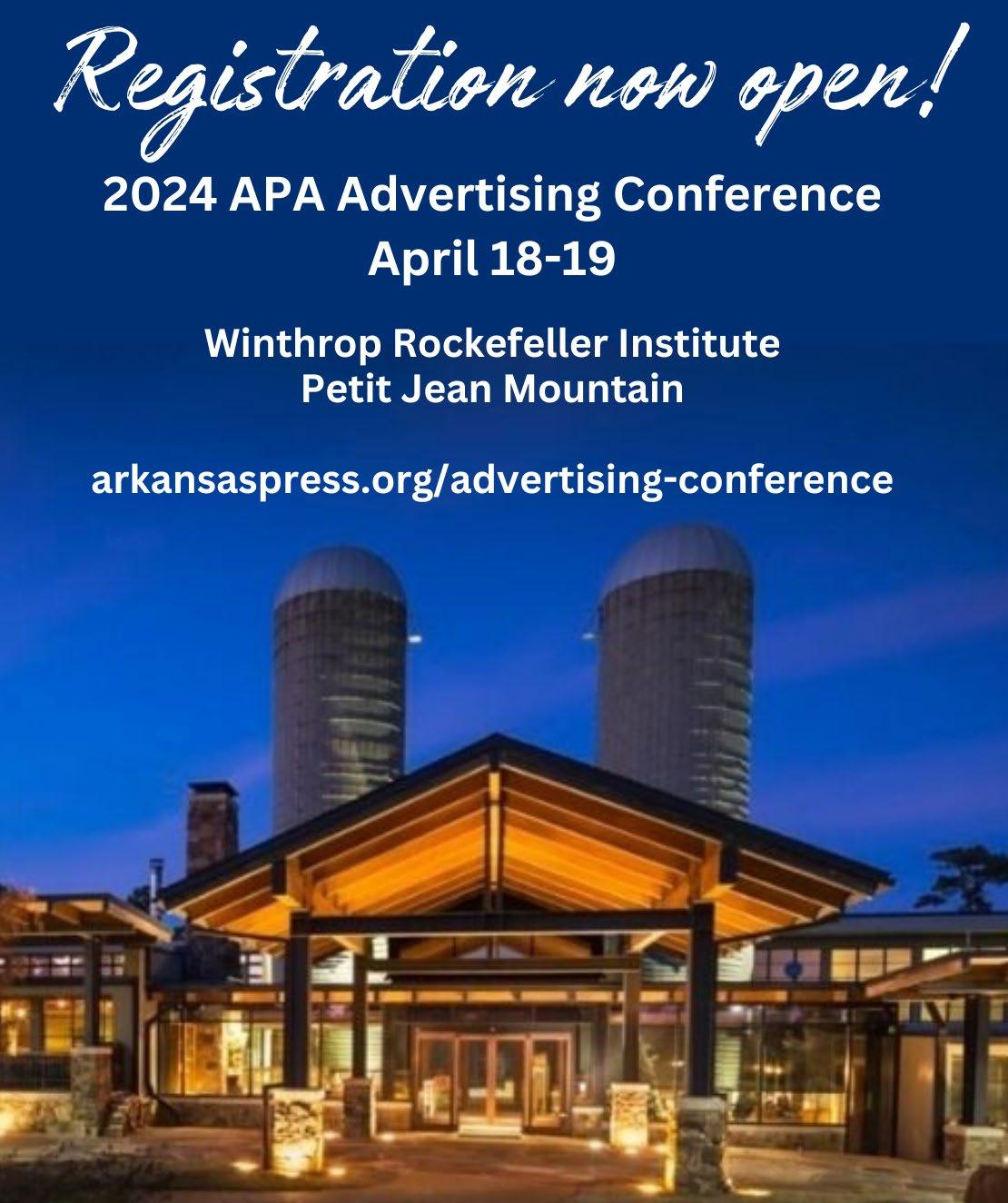
Reading also is a hobby, with normally more time for that in the summer months. She enjoys novels and history.
McCargo has taught varied courses at Fayetteville, including Fundamentals of Journalism, Journalistic Writing Skills, Editing, Event Promotion and Execution, History of the Black Press and African Americans in Documentary Film. She also has served as assistant director of the Center for Ethics in Journalism.
McCargo got one of her earliest introductions to Northwest Arkansas through attending the Arkansas Press Association Convention several years ago in Bentonville, enjoying the sessions and meeting new people. She looks forward to this year’s APA convention, scheduled for June 27-29 at the Embassy Suites by Hilton Jonesboro Red Wolf Convention Center.
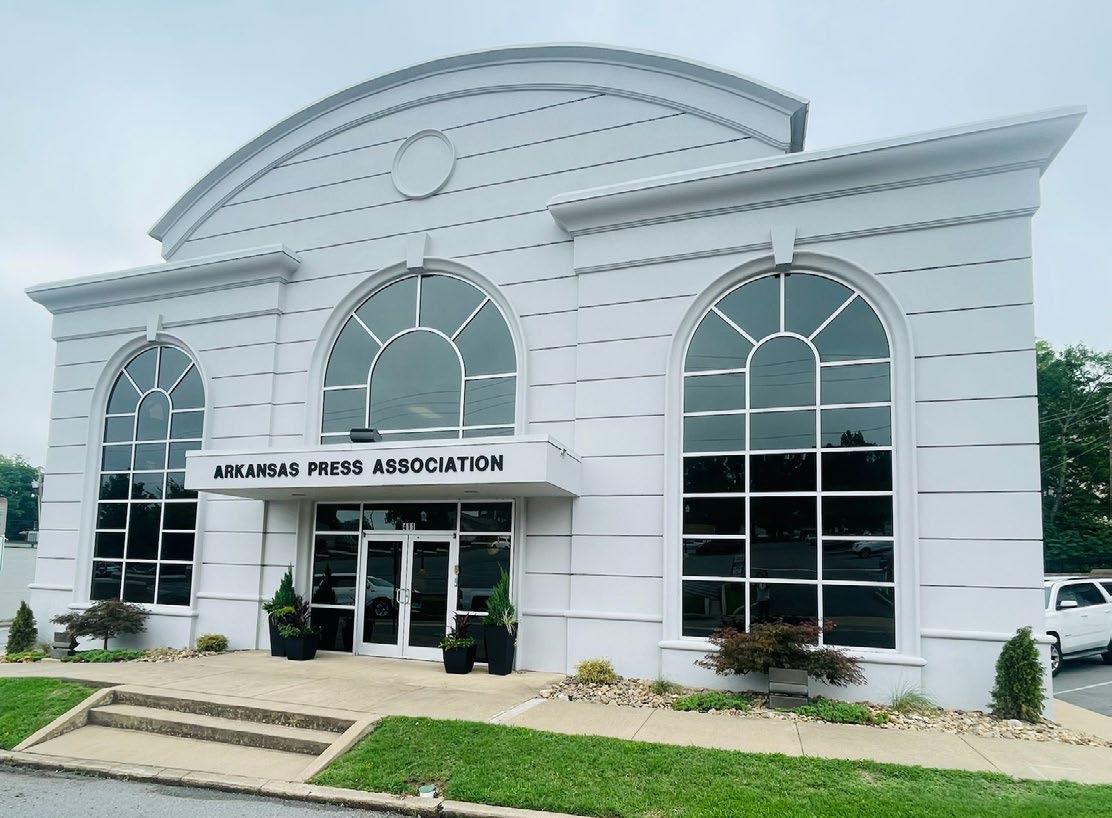
Arkansas Publisher Weekly 4 March 28, 2024
580 square feet • Close to the Arkansas State Capitol OFFICE SPACE AVAILABLE Contact: ashley@arkansaspress.org Parking included • Use of conference room and kitchen
McCargo with Chalise Macklin in KAIT Region 8 Newsroom.
APA Advertising Conference returns to scenic Petit Jean Mountain
For the first time in four years the APA Advertising Conference is set to return to the scenic Winthrop Rockefeller Institute atop Petit Jean Mountain. Long a favorite location for the annual conference, APA’s last visit in 2020 was cut short by the emerging COVID-19 pandemic.
The Institute is located on the site of Winrock Farms, which was founded in 1955 and internationally known for its high-quality purebred Santa Gertrudis and Red Angus cattle. After Gov. Winthrop Rockefeller died in 1973, the nonprofit Winrock International was established using the buildings and grounds of his home and the Winrock Farms headquarters. After Winrock International relocated in 2004, the property reverted to the Winthrop Rockefeller Charitable Trust, which leased the facilities to the University of Arkansas System. A master plan addressed the adaptive reuse and remodeling of 30,000 square feet of space, including restoring barns built when Gov. Rockefeller first developed the property, the construction of new lodging facilities and the addition of pedestrian access and landscaping. Now, in addition to serving the mission of the Winthrop Rockefeller Institute, the site is a secluded location for meetings, conferences and retreats.
The two-day APA Advertising Conference will feature programming and dining in the Institute’s Main Building East. Conference attendees who choose to stay over Thursday night will room in The President’s Lodge, which features 30 guest rooms along with a large Great Room for socializing. Each guest room’s amenities include free Wi-Fi, a 32-inch flatscreen TV, a pod coffeemaker, mini-fridge and microwave, and a hair dryer and ironing board.
New to the campus since APA’s last visit is The Roustabout coffeeshop, located in the former gift shop space. Included on display are various pieces from Gov. Rockefeller’s time in the oil fields (“roustabout” is a nickname for oil field workers), his work abroad, his time in Arkansas and pieces that belonged to or were gifted from his family.
The Roustabout’s interior woodwork is from the first store in Stamps, Baker Drug Store, built by Dr. F. E. Baker. The store’s solid oak furnishings were handmade in
St. Louis in 1902 and shipped to Stamps by rail. Among them are six-foot-long display cases, a back piece with a floor-to-ceiling mirror, tall cabinets and shelving with work counters and drawers underneath. Upon hearing that Baker Drug Store was set to be torn down in 1967, Jeannette Rockefeller bought the entire interior and gave it to Winthrop for their 11th wedding anniversary. The complete interior was disassembled and transported to Winrock Farms, where it now serves as a beautifully restored reminder of the early 20th century.
The advertising conference will begin at the Winthrop Rockefeller Institute at 1:30 p.m on Thursday, April 18, with speaker Richard E. Brown presenting “Digital
Advertising Essentials: A Profitable and Simple Path for Beginners,” followed by a second session, “Success from Day One: Onboarding Sales Executives for Impact.” A reception will be held Friday evening in the Great Room of President’s Lodge, followed by dinner in the Main Building
The schedule on Friday, April 19 includes breakfast, the always-popular Hot Ideas Exchange, a panel discussion, and the 2024 APA Better Newspaper Advertising Awards Luncheon.
A complete conference schedule and registration form can be found on pages 10-11 of this week’s Arkansas Publisher Weekly


Arkansas Publisher Weekly 5 March 28, 2024
President’s Lodge
Roustabout Coffee Shop
Lincoln County newspaper recognized as Business of the Month
The Lincoln American in Star City has been recognized as the Business of the Month for March 2024 by the Star City Area Chamber of Commerce.
The newspaper, which covers news and events in Star City, Grady and Gould, was founded in 1995 by John Whipple. Whipple serves as reporter, editor, publisher and ad manager of The Lincoln American and is described as the “epitome of perseverance and commitment” in his passion for his work and dedication to the community. Whipple’s wife, Pam Whipple, serves as The Lincoln American’s proofreader and circulation manager.
We congratulate The Lincoln American on this well-deserved achievement.
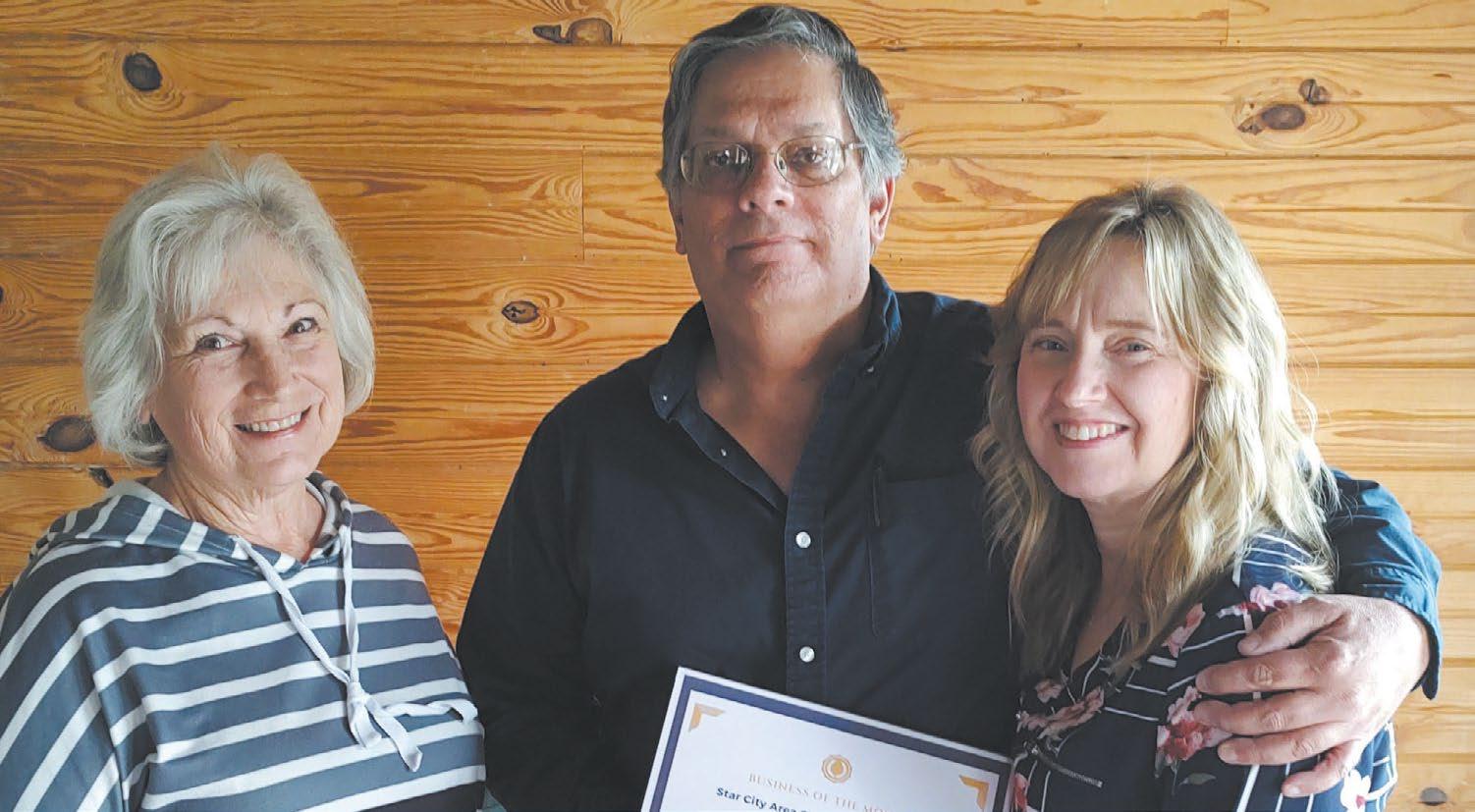
Clinton Presidential Center to host Hussman-Baron discussion
WEHCO Media Chairman and former Arkansas Democrat-Gazette publisher Walter E. Hussman, Jr. will be in conversation with former Washington Post Executive Editor and author Martin “Marty” Baron in the next Kumpuris Distinguished Lecture at the Clinton Presidential Center in Little Rock.
The two will discuss Baron’s new book, “Collision of Power: Trump, Bezos, and the Washington Post,” on Tuesday, April 9 at 6 p.m. Copies of “Collision of Power” may be purchased from the Clinton Museum Store for Baron to sign after the event.
The Washington Post had been a family-
owned newspaper for 80 years until it was sold in October 2013 to Nash Holdings, a holding company owned by billionaire businessman Jeff Bezos. Then, in 2016, Donald Trump was elected President of the United States. The capital’s newspaper, now owned by one of the world’s richest men, was presented with the challenge of reporting on a president who had campaigned against the press as the “lowest form of humanity.”
Baron retired from the Post at the end of February 2021, after more than eight years as executive editor. News staff under his leadership have won 18 Pulitzer Prizes, including 11 for coverage of the assault
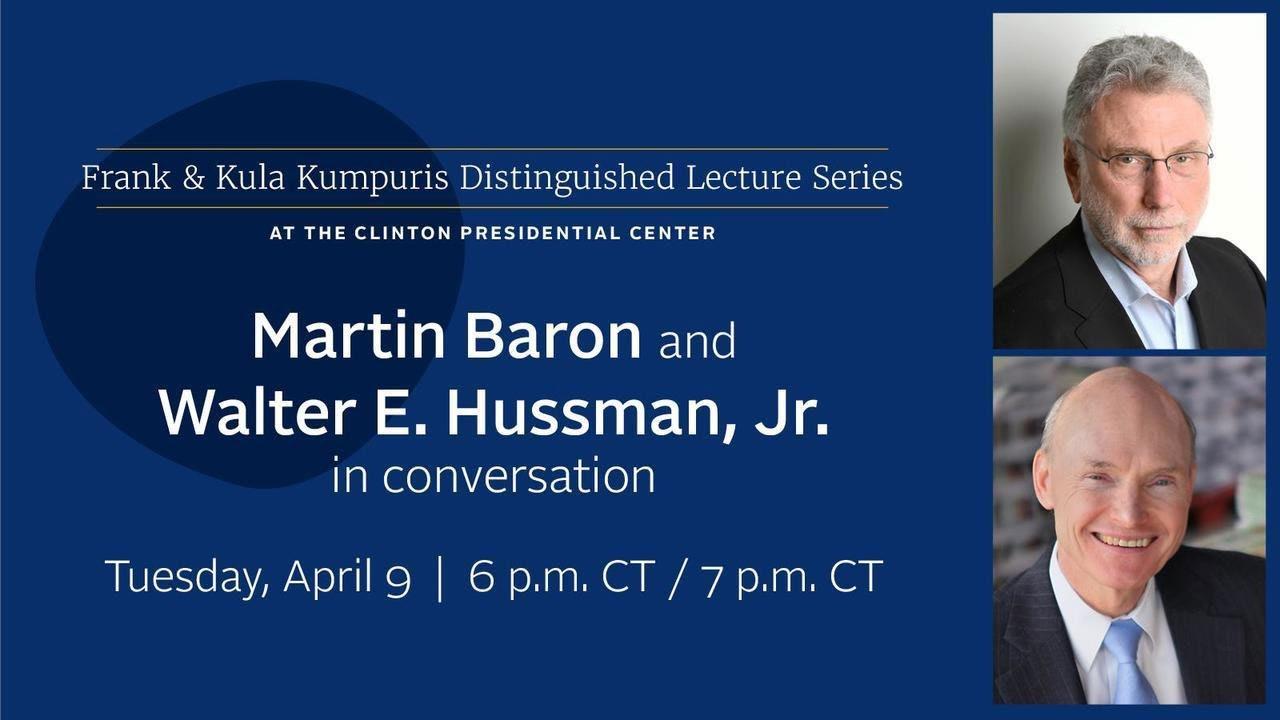
on the Capitol on January 6, 2021 and investigations of the National Security Agency and the presidential campaign of Donald Trump. Baron was formerly top editor of The Boston Globe, which under his leadership won six Pulitzer Prizes, including for its investigation into the Catholic Church’s concealment of clergy sex abuse. That investigation was portrayed in the 2015 movie “Spotlight,” which won the Academy Award for Best Picture and Best Original Screenplay.
Hussman, a third-generation newspaperman, retired as publisher of the Arkansas Democrat-Gazette at the end of 2022. He was named Editor & Publisher magazine’s Publisher of the Year in 2008. He was a member of the Board of Directors of The Associated Press from 2000-2009 and was the first recipient of the Frank Mayborn Leadership Award from the Southern Newspaper Publishers Association, where he served as president in 2001-2002. Hussman was presented with APA’s Golden 50 Service Award for recognition of more than 50 years in Arkansas journalism in 2022.
The Frank & Kula Kumpuris Distinguished Lecture Series is presented by the Clinton Foundation, Clinton Presidential Library, Clinton School of Public Service at the University of Arkansas and AT&T, and is free to attend. RSVP at https://forms.clintonfoundation.org/view.php?id=950476
Star City Area Chamber of Commerce President Debbie Riley with John and Pam Whipple.
Arkansas Publisher Weekly 6 March 28, 2024
Nominations sought for 2024 Gish Award for courage, integrity and tenacity in rural journalism
Each year the Institute for Rural Journalism and Community Issues at the University of Kentucky presents the Tom and Pat Gish Award for courage, tenacity and integrity in rural journalism, named for the couple who exemplified those qualities as publishers of The Mountain Eagle in Whitesburg, Kentucky, for 52 years.
To make a nomination, send a detailed letter with some documentation explaining how the nominee shows the kind of courage, tenacity and integrity that the late Tom and Pat Gish demonstrated at their weekly newspaper in the Central Appalachian coalfield. They withstood advertiser boycotts, business competition, declining population, personal attacks, and even the burning of their office to give their readers the kind of journalism often lacking in rural areas, and were the first winners of the award named for them. Their son, Ben Gish, is now editor and publisher of the Eagle and serves on the award selection committee.
The Madison County Record in Huntsville received the 2022 Gish Award for investigating and reporting on school officials who tried to conceal sexual abuse by members of a boys’ basketball team against some teammates, the district’s failure to immediately report the allegations as required by law and multiple open-meetings violations. The Madison County Record is the first Arkansas newspaper to receive the award.
The 2023 award went to Craig Garnett, publisher of the Uvalde Leader-News in Texas, in the wake of reporting on the response of the Uvalde Police Department to the tragic school shooting of May 2022.
The deadline for nominations to be considered for this year’s award is April 15. Additional documentation may be submitted after the nomination, and may be requested or required. Send your nominating letter, initial documentation and any questions to Institute Director Benjy Hamm at benjy.hamm@uky.edu
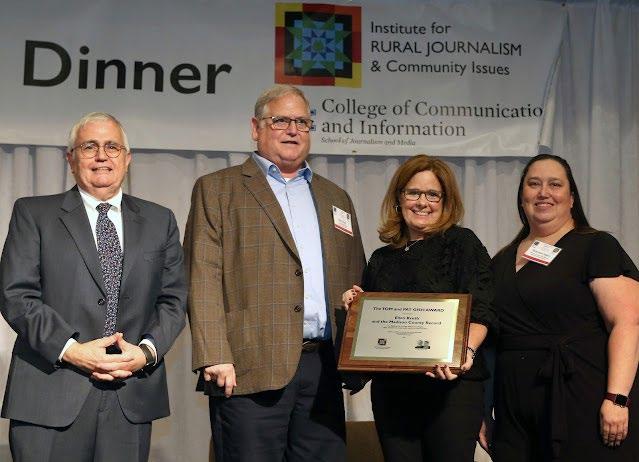
ANF to offer grants to ad conference attendees
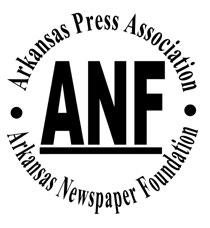
The Arkansas Newspaper Foundation is offering education grants in the amount of $100 to defray the cost of attending the 2024 APA Advertising Conference next month at the Winthrop Rockefeller Institute on Petit Jean Mountain.
The two-day conference is scheduled for April 18-19. All APA member newspapers are invited to apply. One grant will be made per media group. First-time attendees will be prioritized.
The grant application form can be found on page 12 of this week’s Arkansas Publisher Weekly.
Applications should be returned to Terri Cobb at terri@arkansaspress.org no later than Wednesday, April 10.
Arkansas Press Women scholarship applications due by
Tuesday, April 9
Arkansas Press Women has opened its annual contest for a $1,000 scholarship to be presented to an undergraduate student – male or female – who is attending an Arkansas college or university and is planning a career in mass communication, journalism or a related field.
Funding for this scholarship comes from APW’s Maudine Sanders Education Fund, named for the late Maudine Sanders, a previous owner of the Springdale Morning News and a longtime member of Arkansas Press Women. The deadline to apply for the 2024 scholarship is April 9, 2024. The scholarship winner will be honored during the APW annual award ceremony on Saturday, May 18. Visit arkansaspresswomen.org/apwscholarship/ to apply.
For more information, contact Angie Faller, scholarship chair, at amfaller@ualr. edu
Arkansas Publisher Weekly 7 March 28, 2024
Al Cross, then-director of the Institute for Rural Journalism and Ben Gish of The Mountain Eagle with The Madison County Record Publisher Ellen Kreth and General Manager Shannon Hahn, recipients of the institute’s 2022 Tom and Pat Gish Award for courage, integrity and tenacity in rural journalism. Photo by Yung Soo Kim, University of Kentucky School of Journalism and Media.
Guest Editorial: Excuses, excuses –They’re coming, so keep watch
As the campaigns heat up for fall elections, one thing (actually two) you’ll hear about here, often, is the movement to strengthen the FOIA in Arkansas. If you go to a ball game this summer, you might see a person requesting your signature to refer to the people (1) a constitutional amendment, and (2) an initiated act to shield the Freedom of Information laws in Arkansas. Do transparency a favor: Sign both.
The good folks and true who make up the Arkansas Citizens for Transparency have a website, and we refer you to it, specifically the “Donate Now” button:
arcitizens4transparency.org
What the movement needs is signatures. But it also needs cash before that, because ACT has to pay canvassers. How much cash? To get it all done, some say up to $4 million to get enough signatures to compensate those that will invariably be disqualified for any number of reasons. (That happens with signatures during most citizen canvassing.)
But today isn’t a fundraising editorial. Or the rest of this won’t be. We’re trying to look ahead, to those who might oppose these initiatives, but don’t want to say the words I’m Against Government Transparency aloud. What, then, will be the excuses of those who vote “agin” come November?
In our crystal ball, which is cloudy enough on this subject, we see Dark Money funding commercials, either online or on TV, ginning up opposition by finding excuses.
One excuse, but only one, might be: Hey, there’s a $1,000 fine if my small-town mayor’s office (working without a secretary, because of the town’s small stature) misses an email with an FOI request. My mayor doesn’t get paid enough to handle that

kind of thing. What kinda big-government/ anti-small town stunt is this? (Cue a John Mellencamp song.)
Let’s nip that in the bud before we hear this excuse before the upcomin’ this fall: The wording of the act itself—you can find all this on the website—says a fine can be imposed if a custodian “purposely” withholds a public record, and a court has to find “clear and convincing evidence” of the deceit. Fines won’t be allowed for honest mistakes or an email getting lost in the spam folder.
But that’s just one excuse that, we’re sure, is coming.
Those who oppose transparency in government, but don’t want their constituents to hear them say that, will doubtless find others. We hope to hear them early enough to
give Gentle Reader a fair warning, and
an explanation. We’re going to proudly champion the initiatives on this matter for the next few months, being pro-FOIA in general and pro-Arkansas’ FOIA in specific. Remember: There are those amongst us, sometimes representing We the People, who don’t like the mere public committing all this democracy. They’d just rather the public be more, er, “sedate,” and allow them to handle things. In other words, don’t worry your pretty little heads about government.
As long as those types are on the inside, or close to the inside, of government matters in this state, the surest policy for those of us who’d like to keep an eye on government ought to be: En garde!
This editorial was originally published in the Arkansas Democrat-Gazette on March 25, 2024. Reprinted with permission.
Arkansas Publisher Weekly 8 March 28, 2024
LET’S GET SOCIAL @ArkansasPressAssociation @ARPressAssoc
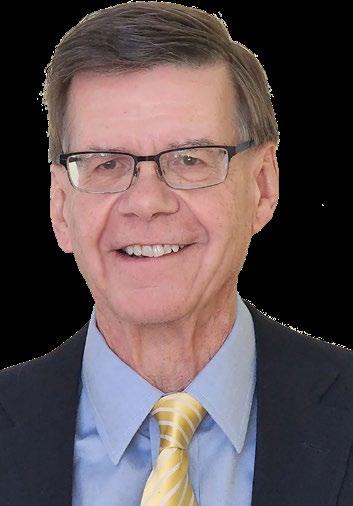


Newsrooms collectively cringe at the obvious errors when an edition rolls off the presses or is posted online. A misspelled word in a headline, especially on page one. A wrong score in a sporting event. An incorrect date of an upcoming event.
Most miscues are acknowledged, but the original mistake has taken its toll on credibility. That can be especially damaging in today’s challenging media landscape when readership share is at a premium.
The above examples and any number of other errors in fact are easy to spot. But scrutinize your reporting for instances of omissions that can be equally harmful to your newspaper’s integrity.
Consider, for example, when someone speaks up at a public meeting and unleashes criticism about an individual or organization. Reporters have little difficulty presenting a balanced report if the accused is at the meeting. But what happens if the individual is not present? And what if deadlines do not permit time to get the other side of the argument?
It’s the classic case of a “single source” story. These reports are no doubt the easiest to write, and they also will prompt calls of “foul play” from readers for good reason.
Consider this editor’s note which prefaced a story.
Note: The following article pertains to a presentation which represented one side of a highly controversial topic. Representatives for the alternative position were not available to contest or counter statements made and statistics shared. As such, that perspective is not a component of this report.
Kudos to the staff for acknowledging the shortcomings in its report, but it could have done better to earn its readers’ trust.
The editor’s note – the newspaper’s lack of initiative in pursuing and presenting the
Guest Column:
Omissions as damaging as glaring errors to credibility
by Jim Pumarlo
other side of the story – is rather remarkable in today’s 24/7 communications landscape. Multiple avenues are available to get the opposing view from picking up the telephone to sending an email to checking out organization websites.
Blind-sided attacks are becoming all too common at meetings of government bodies. Newsrooms, as the clearinghouse of information in your communities, are often in the perfect position to anticipate the circumstances and double down your efforts to present all sides of a story. Brainstorming at a staff meeting can reveal additional opportunities for broader coverage with multiple voices.
A school board is prepared to act on a recommendation to switch from halfday to all-day kindergarten; the packet of materials accompanying the agenda details the reasons. A preview of the meeting is a chance to provide “pro” and “con” arguments including interviews with several individuals. Follow-up reports on a variety of board actions present similar opportunities.
Review other everyday coverage in your newspapers.
A community’s selection of a “citizen of the year” is an automatic feature story – usually a one-on-one sit-down with the honoree. Inject some flavor to the story by including comments from other individuals.
A big-box retailer comes into a town with great fanfare. A sidebar is appropriate to capture the sentiments of those who believe existing local retailers will be helped or hindered.
Most items in police blotters are sufficiently summarized in a few sentences. On occasion, take the time to quiz police on some incidents, and the circumstances can lead to an interesting story.
Tracking down all the voices – all the
perspectives – of a story is just the first step, however. Two other points are important in the spirit of fairness.
First, give the opposing voices equal prominence. Court proceedings are a great example. In other words, don’t put the prosecutor’s arguments on page one and bury the defense’s rebuttal on the jump page. Reader attention is limited on the web, too; present the opposing viewpoints in the first few paragraphs.
Second, don’t be afraid to hold a story if it means delivering a more complete – and fairer – report. That’s especially the case with nondaily newspapers where it can be a few days to a week before readers receive the “other side.” In these cases, the web is a great friend. Newspapers can wait a few hours to pursue all the voices and still deliver a timely report.
The instructive to seek all perspectives of dialogue at government meetings is especially important today as newsrooms deal with diminished resources. Reporters increasingly monitor meetings livestream with no ability for immediate follow-up with individuals.
Seeking and incorporating the many varied – yet pertinent – voices in a story is not always easy. It can take time and hard work – solid journalism that benefits the newspaper and readers alike.
Jim Pumarlo is former editor of the Red Wing (Minn.) Republican Eagle. He writes, speaks and provides training on community newsroom success strategies. He is author of “Journalism Primer: A Guide to Community News Coverage,” “Votes and Quotes: A Guide to Outstanding Election Coverage” and “Bad News and Good Judgment: A Guide to Reporting on Sensitive Issues in Small-Town Newspapers.” He can be reached at www. pumarlo.com and welcomes comments and questions at jim@pumarlo.com.
Arkansas Publisher Weekly 9 March 28, 2024

Send registration and payment by Friday, April 12 to: Arkansas Press Association, 411 South Victory, Little Rock, AR 72201 or email terri@arkansaspress.org Newspaper: Mailing Address: City/State/Zip: Phone: Fax: Email: Attendee Name: 1. _____________________________________________________________________________________ 2. _____________________________________________________________________________________ 3. _____________________________________________________________________________________ 4. _____________________________________________________________________________________ Please list any additional names on a separate sheet. Conference Fee ($100) Includes: Reception, Thursday dinner, breaks, Friday breakfast, awards banquet and all conference materials. Total Attendees: $ $ x $100 Full Conference Fee x $100 Hotel Room x $40 Awards (Lunch Only) $ TOTAL $ Payment Options: Check Enclosed Bill Me Credit Card # Expiration Date VCN# Room 1: Double / King Circle One Person 1: Person 2: Room 2: Double / King Circle One Person 1: Person 2: Room 3: Double / King Circle One Person 1: Person 2: Please list any additional names on a separate sheet. Arkansas Press Association 2024 Advertising Conference Sign Up Today!

Conference Schedule
THURSDAY, APRIL18
1:00 PM
Registration Opens
1:30 PM Welcome, Introductions & Announcements
Session One:
Digital Advertising Essentials: A Profitable and Simple Path for Beginners
Unlock the transformative potential of your traditional print newspaper organization in the ever-evolving digital landscape. Join us in this enlightening exploration, where we'll break down the complexities of engaging in digital advertising at an ABC level – accessible, basic and clear. We're here to demystify the digital advertising world and demonstrate how you can leverage your existing publisher site resources, newsletters and email marketing to embark on a profitable and sustainable journey.
Presented by Richard E. Brown
3:00 PM Break
3:30 PM Session Two:
Success from Day One: Onboarding Sales Executives for Impact
Uncover the blueprint for transforming your print newspaper organization's sales team into a powerhouse, driving revenue and reader engagement. Join us in this illuminating presentation, where we delve into the intricacies of onboarding news sales executives with a keen focus on aligning mission and action. Discover the art and science of translating your organization's mission into tangible Key Performance Indicators (KPIs) and scorecard deliverables that not only keep your new sales executives aligned with your vision but also laser-focused on key deliverables that directly contribute to and enhance your bottom line.
Presented by Richard E. Brown

Conference Presenter
6:00 PM
7:00 PM
8:30 PM Reception Lodge Great Room
Group Dining in the Dining Room
Group Gathering President's Lodge Great Room
FRIDAY, APRIL 19
8:30 AM
8:00 AM 10:15 AM
10:00 AM NOON
Breakfast
HOT Ideas Exchange
Break
Panel Discussion
2024 Better Newspaper Advertising Awards Luncheon
Richard E. Brown is a recipient of the News Media Alliance Rising Star award. He previously served as the director of renewals and digital sales strategy at LPi and held the position of director of digital operations and sales at the Milwaukee Journal Sentinel. Recently, he was the head of digital subscriber churn for Gannett | USA Today Network and is the former senior director of retention for The Daily Beast. Additionally, he is a member of the board of directors for the Wisconsin Newspaper Association Foundation, a monthly columnist for Editor & Publisher magazine, a contributing writer for Digital Content Next, and a revenue sustainability coach for Local Independent Online News (LION Publishing). Richard is the owner of RE Media Holdings, LLC, and is currently leading the Ads & Sponsorships Lab Program at News Revenue Hub.
 By Jim Pumarlo
By Jim Pumarlo



















